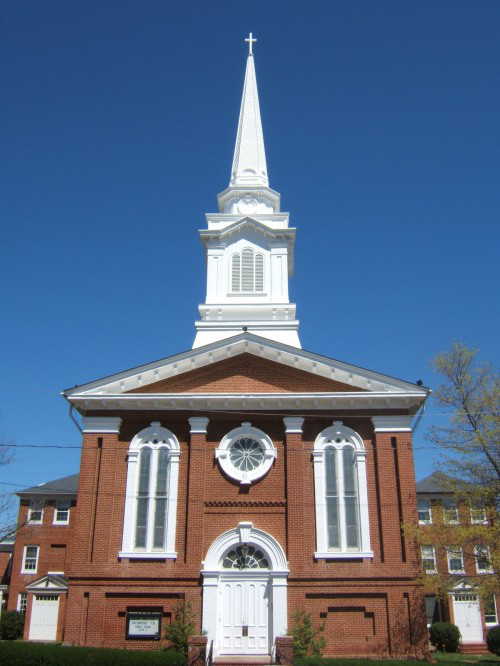
Non-denominational Church
“What is a non-denominational church?”
“What do non-denominational churches believe?”
Answer: This question really has several answers, and they can be either simple or complex. The simplest answer is that a non-denominational church is any church which is not part of a larger denomination. A denomination is a church organization that exercises some sort of authority over the local churches that comprise it. Examples of denominations are Southern Baptist, Episcopal, Wesleyan, Methodist, etc. Non-denominational churches go by many different names and hold to a wide variety of beliefs.
 Why do some churches choose to be non-denominational? Though the answers will vary somewhat, a major consideration is the freedom to direct the ministry and teaching of the local church without interference or control from without. When we look to the Bible, the evidence points to each church as self-governing and answerable directly to God Himself. In the book of Acts, where we read of the first missionary journeys and the establishment of many churches, there is no indication of a hierarchy of authority beyond the local elders of the church. Some people point to the Jerusalem council in Acts 15 as a pattern for denominational structure, but it is nothing of the sort. The Gentiles had been given the gospel under the ministry of Paul and Barnabas, by the direct authority of the Holy Spirit (Acts 13:2; 15:7). The churches established in that first journey were left under the care of elders (Acts 14:23) from their own ranks, after having been taught by Paul and Barnabas. When the council was called at Jerusalem, it was not because of any question of organizational structure or control, but to discuss doctrinal matters about what constitutes salvation (Acts 15:5-6). The apostles who had been directly commissioned by Jesus were the only people who could properly address the question authoritatively.
Why do some churches choose to be non-denominational? Though the answers will vary somewhat, a major consideration is the freedom to direct the ministry and teaching of the local church without interference or control from without. When we look to the Bible, the evidence points to each church as self-governing and answerable directly to God Himself. In the book of Acts, where we read of the first missionary journeys and the establishment of many churches, there is no indication of a hierarchy of authority beyond the local elders of the church. Some people point to the Jerusalem council in Acts 15 as a pattern for denominational structure, but it is nothing of the sort. The Gentiles had been given the gospel under the ministry of Paul and Barnabas, by the direct authority of the Holy Spirit (Acts 13:2; 15:7). The churches established in that first journey were left under the care of elders (Acts 14:23) from their own ranks, after having been taught by Paul and Barnabas. When the council was called at Jerusalem, it was not because of any question of organizational structure or control, but to discuss doctrinal matters about what constitutes salvation (Acts 15:5-6). The apostles who had been directly commissioned by Jesus were the only people who could properly address the question authoritatively.
 When a church is non-denominational, does that mean it has no need of other churches? That may be the belief of some, but it is certainly not the example we find in Scripture. The book of Acts and the New Testament Epistles make it clear that the churches communicated with one another regularly. As Paul and his companions made their missionary journeys, it was not uncommon for the believers to send letters to the other churches (Acts 18:27), or to greet one another through his letters (Romans 16:16). Likewise, when there was a great need, the churches worked interdependently to meet that need—for example, the collection for the famine in Jerusalem (Acts 11:29; 2 Corinthians 8:4). The various churches of the New Testament, though independent, self-governing bodies, were definitely connected in fellowship and cooperative ministry, giving us an example to follow today.
When a church is non-denominational, does that mean it has no need of other churches? That may be the belief of some, but it is certainly not the example we find in Scripture. The book of Acts and the New Testament Epistles make it clear that the churches communicated with one another regularly. As Paul and his companions made their missionary journeys, it was not uncommon for the believers to send letters to the other churches (Acts 18:27), or to greet one another through his letters (Romans 16:16). Likewise, when there was a great need, the churches worked interdependently to meet that need—for example, the collection for the famine in Jerusalem (Acts 11:29; 2 Corinthians 8:4). The various churches of the New Testament, though independent, self-governing bodies, were definitely connected in fellowship and cooperative ministry, giving us an example to follow today.
The measure of any church, whether inside or out of a denomination, is not how it is organized nor what name it is called, but rather how faithfully it adheres to the teachings of the Word of God. No church is inerrant, because churches are made of people who are capable of error. Even the apostles, with all the gifts God gave them, were not without error. Paul records in Galatians 2:11 that “when Peter came to Antioch, I opposed him to his face, because he was clearly in the wrong.” Peter, the first to give the gospel to a Gentile, gave in to pressure by the Judaizers to separate himself from Gentile believers. Paul’s ability to confront Peter was not based on his position as an apostle, but on the revealed truth of God’s Word. Paul complimented the believers in Berea (Acts 17:11) for checking his own teaching against the Bible to find out if he was telling them straight doctrine.
All believers need to be like the Bereans, checking what we are taught against the Word of God to find out if those things are so. If our church is out of line with God’s Word, we must lovingly, patiently give instruction or correction. If it will not be corrected, then we should seek out a church that is faithfully obeying God’s Word.
www.gotquestions.org is the source of this article




